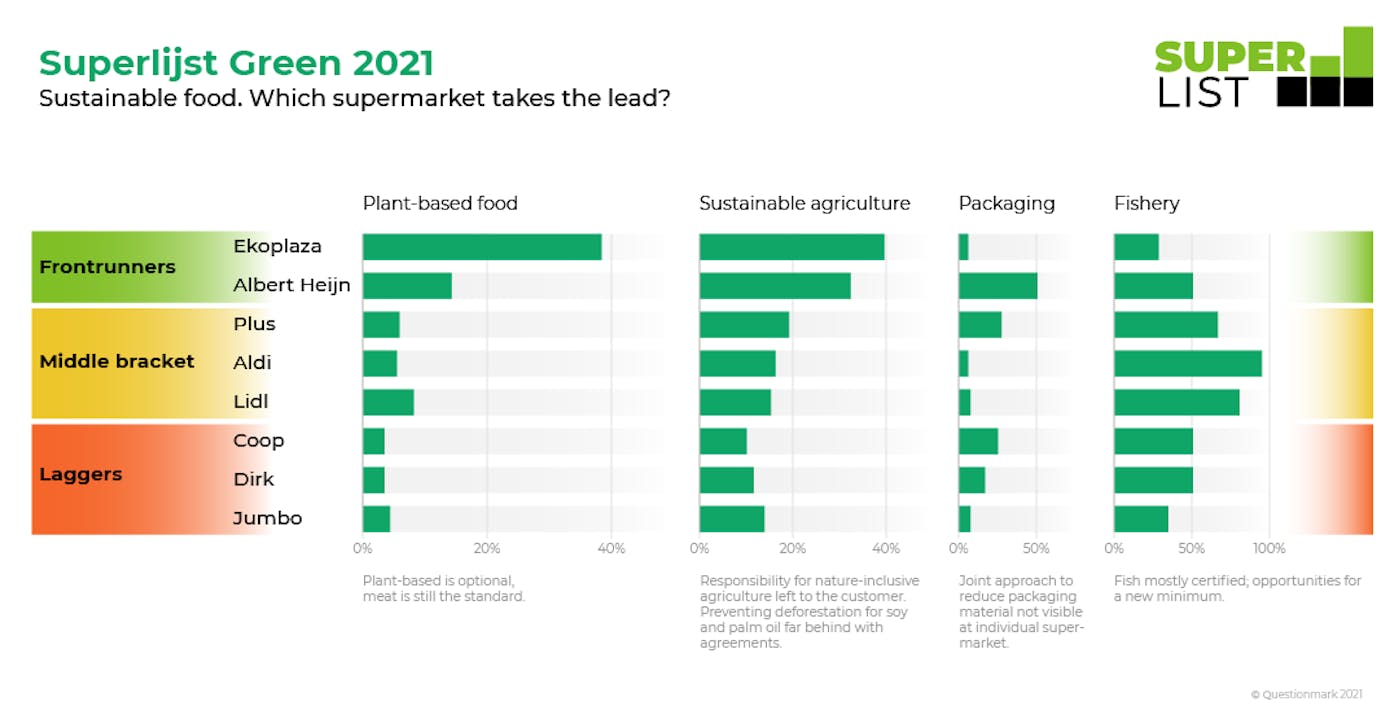Dutch supermarkets do not meet their sustainability commitments
May 27, 2021
Meat remains the standard, few sustainability goals, deforestation prevention insufficient
Dutch supermarket Ekoplaza is front-runner in stimulating nature-friendly agriculture; Albert Heijn is the only Dutch supermarket that provides transparent data on sustainability. Despite important differences, none of the supermarkets progress is in line with their commitments on sustainable food. These are the conclusions of "Superlist Green”, the first research into the sustainability of Dutch supermarkets that shows to what extent supermarkets support and encourage a diet that is good for the environment and nature.
About 70 percent of our daily food comes from the supermarket. Despite their influential position in the food system, there is little evidence that supermarkets are committed to a more sustainable food pattern. Research report “Superlist Green” published today by the Questionmark Foundation, shows that although supermarkets have committed to the Dutch Government’s Climate Agreement and Delta Plan Biodiversity Restoration, most of them do not have measurable objectives for stimulating nature-inclusive agriculture and a more plant-based diet. Supermarkets share little information about the origin and cultivation method of their products. Their approach to tackle the problem of deforestation for soya and palm oil, the share of regionally and nature-inclusively produced food, and the reduction of packaging material are (far) behind the commitments they have made. “This is unacceptable in this era of major climate and biodiversity problems” according to Dutch environmental organizations, Natuurmonumenten, Natuur & Milieu and Mighty Earth, that are affiliated with this research project.
Meat still dominates
The amount of plant-based food in supermarkets is growing, but meat remains the standard. Ready-to-eat meals almost always contain meat and meat dominates in supermarket promotions, even in the 'Week without Meat'. The range of meat substitutes is growing, but this is not being followed by a decrease in the amount of meat. Supermarkets have committed themselves through the Climate Agreement to a decrease in animal protein consumption (including meat) and an increase in vegetable proteins. However, none of the supermarkets has tangible objectives in this area.
Sustainable agriculture
In their shop, supermarkets delegate social responsibility for sustainable agriculture mainly to their customers. This despite the agreement[EC1] that supermarkets would make an effort to give biodiversity a more prominent place in their labelling systems, standards and certification they use. Ekoplaza is a positive exception with a completely organic assortment. Supermarkets do occasionally promote 'locally produced' products in their promotion leaflets and on the shop floor. However, the promised commitment of the Dutch Food Retail Association (CBL) to contribute to a better position for farmers and gardeners who contribute to biodiversity restoration has not happened yet. A missed opportunity especially since local and sustainable food is on the rise, as has been shown by the success of the 'support your locals' actions and the growth of many short-chain initiatives across the country.
Albert Heijn exception in transparency
The Albert Heijn is the only supermarket that reports the share of fruit and vegetables from the Netherlands and the share of organic in their house brands. Albert Heijn is also the only supermarket in The Netherlands that reports in detail on packaging material reductions.
Broken promises to tackle deforestation for soy in animal feed
Despite the promise to end deforestation by soy for animal feed in the supply chains by 2020, supermarkets score insufficiently on tackling deforestation. The risk of large-scale deforestation for soya in the supply chains of supermarkets is undiminished. Even market leader Albert Heijn lags far behind on this commitment.
Frontrunners and laggards
Based on the research results and the weighting, a ranking of the supermarkets was prepared. The ranking shows which supermarkets belong to the frontrunners, the laggards and which are average according to how well they help their customers to make a choice that is good for the environment and nature.
More information
Press contact for the survey: Annelore van der Lint | annelore@thequestionmark.org | +31 (0)6 290 73 879
Do you want to support our work?
Superlist Green
Download the full report Sustainable food. Which supermarkets are taking the lead? (in Dutch)







